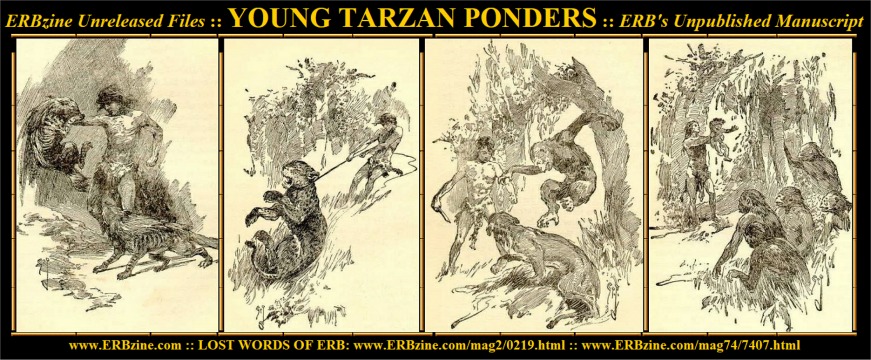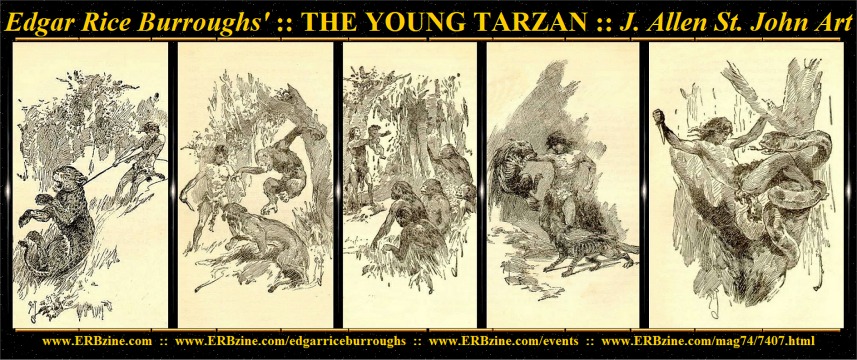
Young Tarzan Ponders


An unreleased manuscript fragment
by Edgar Rice Burroughs
Hand written and partially typed
by Mr. Burroughs.
October 28, 1930
Shared by Danton Burroughs and Transcribed for Web viewing by Bill
Hillman (2005)

Kudu, the sun, rode high in the cloudless
heavens above an African jungle lying mysterious beneath the concealing
canopy of its foliage; hiding its secrets from even the all-seeing eye
of Kudu, the ever curious, moving slowly over the world, striving to penetrate
the quietly billowing waves of verdure that hid the jungle from him; only
occasionally vouchsafing a fleeting glimpse of the myriad life that moved
constantly among the eternal shadows.
To the likeness of Sheeta, the leopard,
Kudu mottled the bronzed skin of a naked youth sitting at the foot of the
bole of a hoary patriarch of the forest -- a sylvan demi-god beneath a
shock of tousled black hair, sitting with chin in cupped palms, a personification
of melancholy.
Tarzan of the apes was depressed
-- a state of mind that constituted a new experience in his brief life
for youth and health, coupled with a vast curiosity and an unflagging interest
in life and all its multifarious jungle activities, had heretofore maintained
his ebullient spirits remote from any suggestion of dejection.
He was lonely. And yet all about
him was the great apes of the tribe of Kerchak. These were his people.
Kala, his foster mother, was there,
peeling the bark from a nearby tree in search of luscious grubs; Teeka,
sleek and young and beautiful, whom he liked almost as much as he liked
Kala, though with a difference that sometimes puzzled him when he took
the time to think about it, was there; there, too, were Taug and Bo-lat,
play fellows of those childhood days that, though he did not realize it,
were already gone, for Tarzan was no longer a child, no longer the little
Balu fierce Kala had nursed and protected during the years of his weakness.
Long since had Taug and Bo-lat laid
aside childish things. Now they were fierce, hairy bulls, already bulking
larger even in the presence of Kerchak the king, or that other mighty mangani,
Terkoz, who, looking with jealous eyes upon Kerchak, would be king.
In the meager language of the mangani
there were no words to describe the sadness weighing so heavily upon the
heart of the foster son of Kala or its cause, but the truth was that Tarzan
was the victim of an acute inferiority complex. Too often had he looked
in the still waters of the pool; too much had he brooded upon what they
had revealed -- the white, hairless skin, the grey pupils rimmed with white,
the puny nose and that totally inadequate mouth armed with utterly futile
teeth that transformed a snarl into nothing more than a provocation to
derision. How might a bull impress an antagonist with teeth like his!
Tarzan cast envious glances at Taug
and Bo-lat. How beautiful those beetling brows and deep-sunk eyes, the
generous noses of them -- especially Bo-lat's! It spread almost across
his face. It was his choicest possession and that the tribe felt a certain
communal pride in it was evidenced by the seal of their approval in the
name they had conferred upon him -- Bo-lat -- which means Flat-nose in
the primitive language of the mangani, the great apes.
Disconsolate, Tarzan moved closer
to Kala and squatted down beside her. "Why am I not like Taug and Bo-lat?"
he demanded presently. "Why is Tarzan so hideous?"
"You cannot help it," relied Kala,
"your father was a Tarmangani."
"Did he have a white skin and a
pinched nose and a little mouth?" demanded Tarzan. "Were his eyes white
rimmed and hideous?"
"Yes," replied Kala, "he was a great
white ape."
"Where is he?" asked Tarzan. "Where
is the Tarmangani who is my father?"
"Kerchak killed him, when you were
a little balu, in the lair by the wide water where you go so often."
"Are there other Tarmangani?" asked
Tarzan, for with the growing consciousness that he differed from his fellows
of the tribe of Kerchak came the first stirrings of an urge to find others
of his own kind.
"I have seen only one," replied
Kala, "but there are the Gomangani."
"What are they?"
"They, too, are hairless like the
Tarmangani, your father, but their skins are black."
"Where are they?"
"Once Kerchak led us far from the
hunting grounds of our people. It was a hungry year when there were no
cabbage palms, nor gray plums, and the pisaugs? and scunatimes?
withered in the bud. We were compelled to hunt in a strange country. Then,
for the first time, I saw the Gomangani." Kala growled and bared her great
fighting fangs and Tarzan knew that the Gomangani were enemies of the tribe
of Kerchak.
"But you saw no mangani like Tarzan?"
he insisted.
"I saw none," replied Kala, "but
Tublat, going close to the strange lairs of the Gomangani one night when
Goro was fat in the sky and cast her full light upon the jungle, said that
he saw a she Tarmangani -- a young she with skin like the skin of Tarzan
and hair upon her head that was like the light of Kudu bursting through
the dark clouds that bring usha, the wind, and ara, the lightning.
"A young she who looks like Tarzan,"
mused the youth. He glanced at Teeka and his brows knit in a frown of speculation
as he sought to visualize a she as hideous as himself.
Yet the thought of her stimulated
his imagination and aroused within him a desire to investigate and perhaps
as well an instinctive biological urge that attracted him to one of his
own kind.
For some time he sat in silent meditation
pondering the matter; then he sought out Tublat, his foster father. Between
Tublat and Tarzan was an enmity as old as the youth.
From the time that his own father
had been killed as he sat mourning her death beside the body of his young
wife, and Kala had snatched him from his cradle, Tublat had hated him with
a savage jealousy that had increased with the passing years during which
Kala had been forced to devote all her attention to the puny, helpless
man-thing instead of bringing sturdy young apes into the world.
During the intervening years Tublat
had sought on numerous occasions to destroy the man-child. At first Kala
had thwarted him, and gradually Tarzan had developed such strength, agility,
and cunning that of late Tublat had learned to fear that in an encounter
he might prove the victim rather than the victor; but all this only added
to his hatred which was in no way lessened by the tricks with which Tarzan
was constantly annoying him.
So when Tarzan approached him now
and asked where lay the lairs of the Gomangani in which he had seen the
golden haired she-tarmangani, Tublat only bared his fighting fangs and
growled.
End of ERB's unfinished manuscript




![]()

![]()